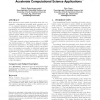Free Online Productivity Tools
i2Speak
i2Symbol
i2OCR
iTex2Img
iWeb2Print
iWeb2Shot
i2Type
iPdf2Split
iPdf2Merge
i2Bopomofo
i2Arabic
i2Style
i2Image
i2PDF
iLatex2Rtf
Sci2ools
120
click to vote
FPGA
2009
ACM
2009
ACM
A parallel/vectorized double-precision exponential core to accelerate computational science applications
Many natural processes exhibit exponential decay and, consequently, computational scientists make extensive use of e−x in computer simulation experiments. While it is common to implement transcendental functions (sine, cosine, exponentiation, etc.) in hardware using the well-known CORDIC algorithm, many contemporary FPGA implementations either use fixed point or reduced precision floating-point operations (which suffers from a high average/mean error). Unfortunately, these solutions are unacceptable for many computational scientist who require the accuracy of doubleprecision values. This paper presents a direct implementation of an IEEE 754 double-precision e−x FPGA core to support computational science applications. The design is similar to CORDIC but has been modified to specifically support exponentiation; it is pipelined and parallel to efficiently handle large vectors of parameters. Compared to solutions described in the literature, it consumes lesser logical gates, enab...
Computational Scientist | Double-precision E−x Fpga | FPGA 2009 | Hardware | Well-known Cordic Algorithm |
| Added | 19 May 2010 |
| Updated | 19 May 2010 |
| Type | Conference |
| Year | 2009 |
| Where | FPGA |
| Authors | Robin Pottathuparambil, Ron Sass |
Comments (0)

